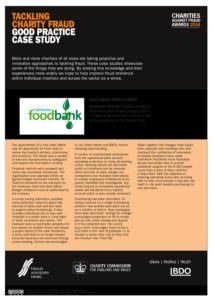Improving financial controls (Colchester Food Bank)
More and more charities of all sizes are taking proactive and innovative approaches to tackling fraud. These case studies showcase some of the things they are doing. By sharing this knowledge and their experiences more widely we hope to help improve fraud resilience within individual charities and across the sector as a whole.
Case study: Small charity
 Colchester Foodbank provides emergency food and support to local people in crisis. It is part of the nationwide network of food banks supported by The Trussell Trust.
Colchester Foodbank provides emergency food and support to local people in crisis. It is part of the nationwide network of food banks supported by The Trussell Trust.
The appointment of a new chief officer was an opportunity for fresh eyes to review the charity’s policies, procedures and practices. The result was a number of low-cost improvements to safeguard and expand the food bank’s funding.
Financial controls were reviewed and some new processes introduced. The organisation now operates within an agreed budget monitored monthly. All financial transactions are overseen by the treasurer, chair and chief officer. Budget variations must be authorised by the trustees.
A survey among volunteers revealed some particular concerns about the security of petty cash and the need to expand online fundraising. A new, lockable collections box is now wall-mounted in a public area in clear sight of staff, volunteers and clients. The treasurer acts as key-holder, empties the box weekly (at random times) and keeps a proper record of the cash donations. A petty cash float is no longer needed because expenses are now paid through online banking. Donors are encouraged to use direct debits and BACS, further reducing cash-handling.
A number of unauthorised withdrawals from the operational bank account prompted a decision to move all banking online. Banking details are still made public so donations can be received direct and free of bank charges but transactions are reviewed twice-weekly to enable suspicious withdrawals to be quickly identified and investigated. Any funds surplus to immediate operational needs are transferred to a deposit account which is also closely controlled.
Fundraising has been diversified. To reduce reliance on a single fundraising platform new profiles have been set up on a number of others. New campaigns have been launched: ‘change for change’ encourages supporters to fill an empty jam jar with small change and deposit it in the collection box; ‘be a brick, buy a brick’ encourages them to buy a £10 brick in the ‘wall of gratitude’ or to donate in some other way to help fund the charity’s new ‘Food HQ’.
Taken together the changes have saved time, reduced cash handling risks and improved the confidence of volunteers. Increased donations have made Colchester Foodbank more financially secure and better able to provide sustained support to the 6,300 people (more than a third of them children) it helps feed. With the objective of reducing operating costs (and so being able to help more people) it has also set itself on the path towards purchasing its own premises.
Download
Category Case studies
